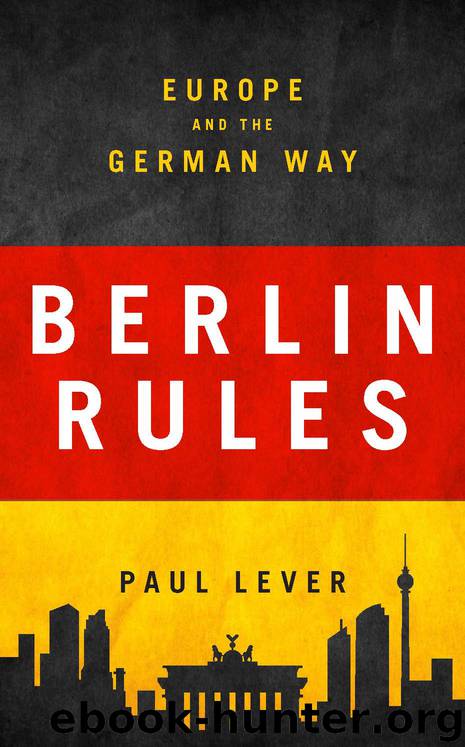Berlin Rules: Europe and the German Way by Paul Lever

Author:Paul Lever [Lever, Paul]
Language: eng
Format: mobi
Tags: Europe, 21st century history, International Relations, European history, 20th Century history, Financial crises and disasters, Germany, EU, International Institutions, Economic History
Publisher: I.B.Tauris
Published: 2017-05-29T16:00:00+00:00
SIX
The Ever-Closer Union
The EU, and the euro, have brought Germany huge economic advantages. The political structures and priorities of the EU reflect those of Germany itself. The EU enables Germany to escape from its own past and offers it a framework for influencing the world without appearing nationalist in doing so. No wonder, therefore, the political class in Germany is wholeheartedly in favour of it. Being in favour of something translates easily into wanting more of it. So no wonder too that, when confronted with a new political or economic challenge, German politicians instinctively look to the EU as a potential vehicle for finding a solution.
What is strange, however, is the uncritical nature of their professed commitment to more European integration, their reluctance to spell out what such integration might eventually mean and the huge gulf between what they say about Europe and how they behave within it.
* * *
Officially, Germany favours what it calls a political union. This has been the position of successive German governments for decades. The term has, in Germany at any rate, a nice sound to it – sufficiently vague not to worry those in other member states who might have reacted badly to more precise concepts such as federation or confederation. In the past (though less so nowadays), German politicians often used to add the caveat that in speaking of a political union they did not of course mean a United States of Europe, still less to call into question the existence of Europe’s nation states.
Efforts by outsiders to tease out the nature of such a political union have always failed. In 1997, the last year of John Major’s government in Britain, the then foreign secretary, Malcolm Rifkind, tried specifically to get a German answer to the question of what was the destination of, to use the jargon, the European project. He embarked on a short mini-tour of Germany in which he gave several speeches, mainly to student audiences, in which he argued for greater clarity about the aim of further European integration and greater honesty on the part of governments about its limitations as well as its opportunities. He received no answers. The audiences themselves seemed puzzled as to why it was necessary to know where Europe was going: they seemed content just to be on a journey. The German government thought it wrong to raise the issue at all.
Chancellor Kohl was particularly incensed. When I paid my introductory call on him as ambassador the following year it was the first subject he raised. He made clear that he considered it discourteous and unacceptable for a British minister to come to Germany and ask questions of this kind. He jabbed his stubby fingers on the table to emphasise the point and his German, never the most limpid at the best of times, became almost incoherent. It was almost as if a blasphemy had been committed in a place of worship.
The analogy is an apt one. The European Union is to some degree Germany’s state religion.
Download
This site does not store any files on its server. We only index and link to content provided by other sites. Please contact the content providers to delete copyright contents if any and email us, we'll remove relevant links or contents immediately.
The Secret History by Donna Tartt(16608)
The Social Justice Warrior Handbook by Lisa De Pasquale(11485)
Thirteen Reasons Why by Jay Asher(7782)
This Is How You Lose Her by Junot Diaz(5753)
Weapons of Math Destruction by Cathy O'Neil(5029)
Zero to One by Peter Thiel(4817)
The Myth of the Strong Leader by Archie Brown(4785)
Promise Me, Dad by Joe Biden(4440)
Stone's Rules by Roger Stone(4412)
Beartown by Fredrik Backman(4404)
How Democracies Die by Steven Levitsky & Daniel Ziblatt(4392)
The Fire Next Time by James Baldwin(4336)
100 Deadly Skills by Clint Emerson(4070)
A Higher Loyalty: Truth, Lies, and Leadership by James Comey(4025)
Rise and Kill First by Ronen Bergman(4008)
The David Icke Guide to the Global Conspiracy (and how to end it) by David Icke(3875)
The Farm by Tom Rob Smith(3869)
Secrecy World by Jake Bernstein(3773)
The Doomsday Machine by Daniel Ellsberg(3725)
